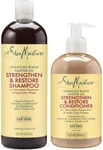Buying Guide for the Best Anti Breakage Shampoos
Choosing the right anti-breakage shampoo can make a big difference in the health and strength of your hair. The main goal of these shampoos is to reduce hair breakage, strengthen strands, and help you maintain longer, healthier hair. When shopping for an anti-breakage shampoo, it's important to look beyond marketing claims and focus on the ingredients and features that match your hair type and needs. Understanding the key specifications will help you make a more informed choice and get the best results for your hair.IngredientsIngredients are the most important aspect of any anti-breakage shampoo. They determine how effective the shampoo will be at strengthening your hair and preventing breakage. Look for ingredients like proteins (such as keratin or silk protein), vitamins (like biotin or panthenol), and natural oils (such as argan or coconut oil) that help reinforce hair structure and add moisture. Avoid shampoos with harsh sulfates or high alcohol content, as these can strip hair and make breakage worse. If your hair is fine, you may want lighter ingredients, while thicker or curly hair can benefit from richer, more nourishing formulas.
Hair Type CompatibilityNot all anti-breakage shampoos are suitable for every hair type. Some are formulated specifically for fine, straight hair, while others are better for thick, curly, or color-treated hair. It's important to choose a shampoo that matches your hair's texture and needs. For example, if you have fine hair, look for lightweight formulas that won't weigh your hair down. If your hair is curly or very dry, opt for a more moisturizing and nourishing shampoo. Reading the label and understanding your own hair type will help you pick the right product.
Protein ContentProtein is a key ingredient in anti-breakage shampoos because it helps repair and strengthen damaged hair. However, too much protein can make hair stiff or brittle, especially if your hair is already healthy or low-porosity. Shampoos with high protein content are best for hair that is visibly damaged, chemically treated, or prone to breakage. If your hair is only mildly damaged or you use protein treatments elsewhere in your routine, a lower-protein shampoo may be a better fit.
Moisturizing PropertiesMoisture is essential for preventing breakage, as dry hair is more likely to snap and split. Anti-breakage shampoos often include moisturizing ingredients like glycerin, aloe vera, or natural oils. If your hair feels dry, frizzy, or brittle, prioritize shampoos with strong moisturizing properties. If your scalp tends to get oily quickly, you may want a more balanced formula that hydrates without leaving residue.
Sulfate-Free FormulaSulfates are cleansing agents that can strip natural oils from your hair, making it more prone to dryness and breakage. Many anti-breakage shampoos are sulfate-free to provide a gentler cleanse. If your hair is fragile, color-treated, or you wash it frequently, a sulfate-free shampoo is usually a better choice. If you have very oily hair or use a lot of styling products, you might prefer a shampoo with mild cleansing agents, but still avoid harsh sulfates.
pH BalanceThe pH level of a shampoo affects how it interacts with your hair and scalp. A pH-balanced shampoo (usually between 4.5 and 5.5) helps keep the hair cuticle smooth and reduces the risk of breakage. If you have sensitive skin or your hair is prone to frizz and breakage, look for shampoos that mention being pH-balanced. This is especially important if you have chemically treated or color-treated hair.


















